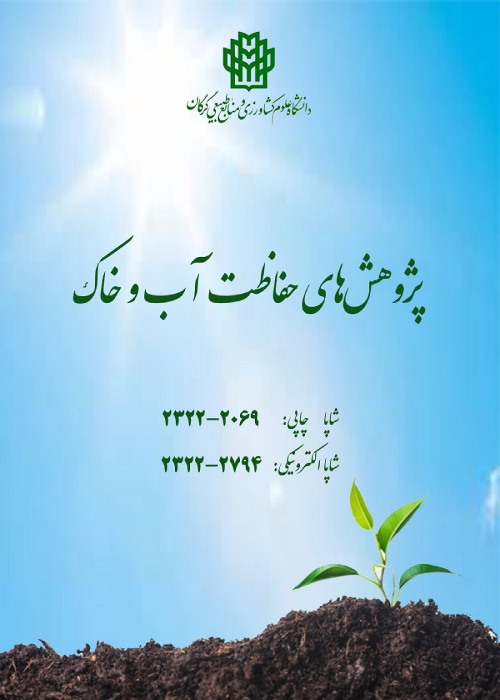The efficiency of earthworms and rhizobacteria on mycorrhizal symbiosis and growth of three plant species in a soil contaminated with Lead (Pb) metal
Author(s):
Article Type:
Research/Original Article (دارای رتبه معتبر)
Abstract:
Introduction:
Lead (Pb) is considered to be particularly toxic and responsible for significant decreases in biological activities in soils. Phytoremediation is an emerging and low-cost technology that utilizes plants to remove, transform, or stabilize contaminants located in water, sediments, or soils. The success of phytoremediation depends on the interactions between rhizosphere macro and microorganisms and plant roots. Among these organisms, the role of earthworms, mycorrhizal fungi, and plant growth promoters' rhizobacteria have been considered. In this study, we have evaluated and compared the combined effects of earthworms and bacteria on root colonization and plant growth in a contaminated soil.
Material and method:
Three plant species seeds (Zea mays (maize); Cynodon dactylon (bermudagrass) and Stachys inflata), after surface-sterilization and germination were transplanted into each plastic pot contained 4 kg of contaminated soil (collected from bama mining area located in the southwest of Isfahan) that already autoclaved at 121 oC for 2 h. A completely randomized design with 2×2×2 factorial treatment combination was used with the following factors: with or without earthworm treatments (Eisenia foetida), with or without arbuscular mycorrhizal (AM) fungal treatments and with or without rhizobacteria. After about three (bermudagrass and maize) and four (Stachys inflata) month growth in greenhouse condition, plant shoots were harvested. Pb and phosphorus (P) concentration, root colonization, spore abundance and root colonized length were determined.
Results and Discussion: In general, inoculation of these organisms differently affected root colonization, spore abundance, soil phosphorus (P) availability and plant growth, and showed variable results depending upon plant species and soil organisms involved. The significant and negative correlations between soil P availability and root colonization for all the plants (maize: r=-0.48, P<0.05; bermudagrass: r=-0.74, P Conclusion: This study showed that increasing the availability of soil P and Pb could be one of the decrease factors in root colonization, but the negative Pb effects depend on plant sensitivity. Furthermore, root colonization may not alone be a suitable index for plant growth and could be different with plant species and soil P or Pb concentrations. Furthermore, the relationship between plant growth and mycorrhizal symbiosis was higher in plant sensitive to Pb toxicity.
Results and Discussion: In general, inoculation of these organisms differently affected root colonization, spore abundance, soil phosphorus (P) availability and plant growth, and showed variable results depending upon plant species and soil organisms involved. The significant and negative correlations between soil P availability and root colonization for all the plants (maize: r=-0.48, P<0.05; bermudagrass: r=-0.74, P Conclusion: This study showed that increasing the availability of soil P and Pb could be one of the decrease factors in root colonization, but the negative Pb effects depend on plant sensitivity. Furthermore, root colonization may not alone be a suitable index for plant growth and could be different with plant species and soil P or Pb concentrations. Furthermore, the relationship between plant growth and mycorrhizal symbiosis was higher in plant sensitive to Pb toxicity.
Keywords:
Language:
Persian
Published:
Water and Soil Conservation, Volume:25 Issue: 3, 2018
Pages:
97 to 112
magiran.com/p1890466
دانلود و مطالعه متن این مقاله با یکی از روشهای زیر امکان پذیر است:
اشتراک شخصی
با عضویت و پرداخت آنلاین حق اشتراک یکساله به مبلغ 1,390,000ريال میتوانید 70 عنوان مطلب دانلود کنید!
اشتراک سازمانی
به کتابخانه دانشگاه یا محل کار خود پیشنهاد کنید تا اشتراک سازمانی این پایگاه را برای دسترسی نامحدود همه کاربران به متن مطالب تهیه نمایند!
توجه!
- حق عضویت دریافتی صرف حمایت از نشریات عضو و نگهداری، تکمیل و توسعه مگیران میشود.
- پرداخت حق اشتراک و دانلود مقالات اجازه بازنشر آن در سایر رسانههای چاپی و دیجیتال را به کاربر نمیدهد.
In order to view content subscription is required
Personal subscription
Subscribe magiran.com for 70 € euros via PayPal and download 70 articles during a year.
Organization subscription
Please contact us to subscribe your university or library for unlimited access!




